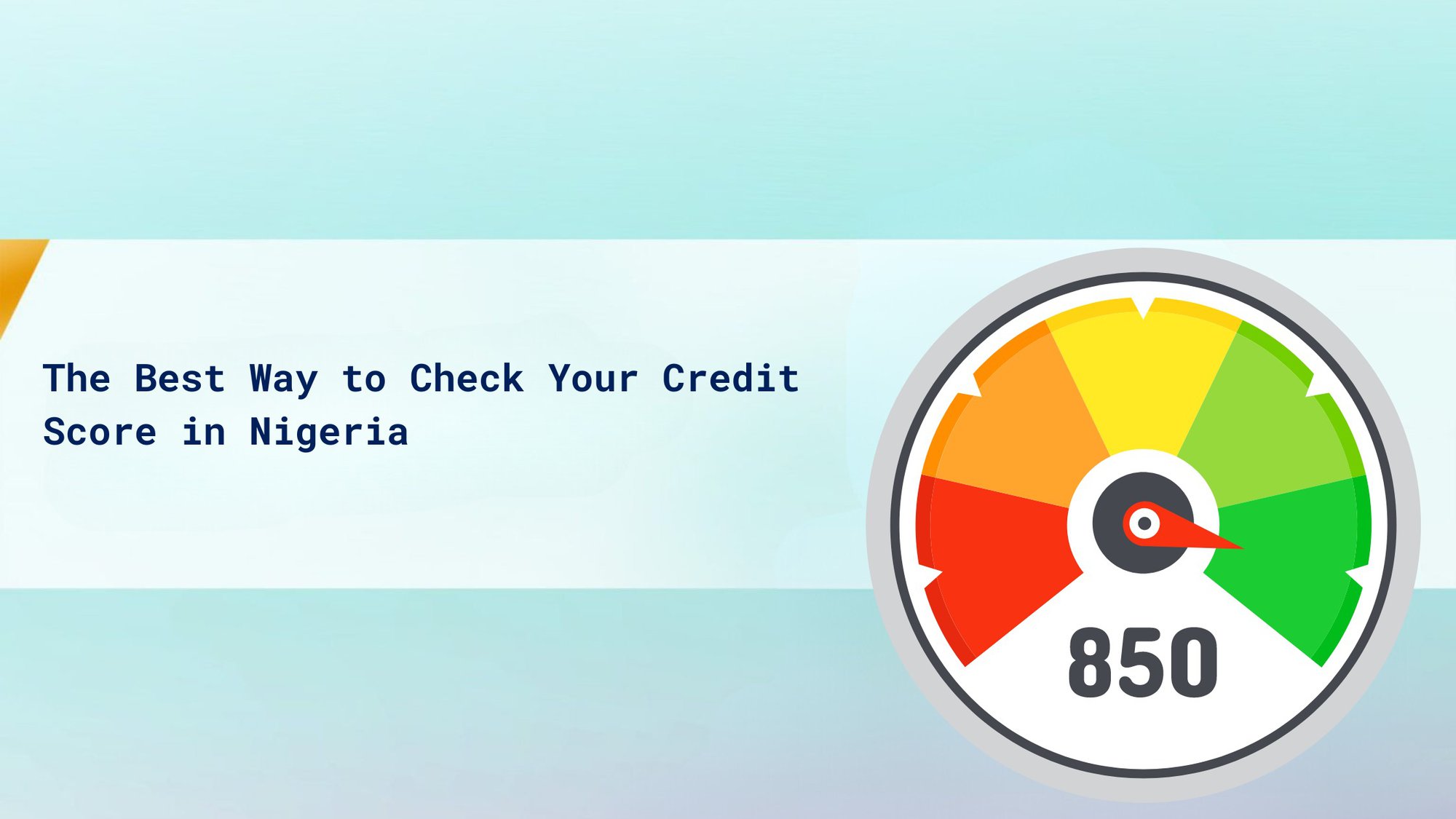
The Best Way to Check Your Credit Score in Nigeria
Author Taiwo Temitope-Adesope
Checking your credit score in Nigeria has become more seamless with advancements in technology and the availability of various online tools and services.
Your credit score is usually presented as a numerical value, often ranging from 300 to 850, with higher scores indicating better creditworthiness.
To maintain a healthy credit score in Nigeria, it's essential to practice responsible financial habits, such as making timely payments, keeping credit card balances low, and monitoring your credit report regularly.
Why Checking Your Credit Score is Crucial for Financial Success
Checking your credit score is essential for maintaining financial stability, accessing credit at favourable terms, and achieving long-term financial goals.
It enables you to make informed financial decisions and proactively improve your creditworthiness, ultimately contributing to your financial success.
Checking your credit score is crucial for financial success for several reasons:
● Understanding Your Financial Health
Your credit score is a numerical representation of your creditworthiness based on your credit history.
By checking your credit score regularly, you gain insight into your financial health and can identify areas for improvement.
● Access to Credit
A good credit score increases your chances of being approved for loans, credit cards, and other forms of credit. Lenders use your credit score to assess the risk of lending to you.
● Interest Rates and Loan Terms
Your credit score directly impacts the interest rates and terms you receive on loans and credit products.
A higher credit score typically results in lower interest rates, saving you money over the life of a loan.
● Insurance Premiums
Insurance companies sometimes use credit information to determine insurance premiums. A higher credit score may result in lower premiums for auto, homeowners, or renters insurance, as it suggests lower risk to the insurer.
● Identity Theft and Fraud Detection
Regularly monitoring your credit score allows you to detect any unauthorised activity or errors on your credit report, which could be indicative of identity theft or fraud.
Common Mistakes That Can Negatively Impact Your Credit Score
In Nigeria, as in many other countries, certain actions or behaviours can harm your credit score.
Here are some common mistakes that can negatively affect your credit score in Nigeria:
● Late or Missed Payments
Failing to make timely payments on your credit accounts, such as loans, credit cards, or utility bills, can significantly damage your credit score. Payment history is one of the most critical factors in determining your creditworthiness.
● Applying for Multiple Loans Simultaneously
Making numerous credit applications within a short period can signal financial distress to lenders and may lower your credit score.
Each credit inquiry generates a "hard inquiry" on your credit report, which can slightly reduce your score.
● Defaulting on Loans
Defaulting on a loan by consistently failing to make payments can have severe consequences for your credit score. It indicates to lenders that you're high risk and can lead to legal action or debt recovery measures.
● Ignoring Errors on Your Credit Report
Failing to review and address errors on your credit report can result in inaccurate information affecting your credit score. Regularly check your credit report for inaccuracies and dispute any errors promptly with the credit bureau.
● Closing Old Credit Accounts
Closing old credit accounts, especially ones with a long history of positive payment activity, can shorten your credit history and potentially lower your credit score. Consider keeping these accounts open to maintain a longer credit history.
● Guaranteeing a Loan
Acting as a guarantor for someone else's debt makes you equally responsible for the debt. If the borrower defaults on payments, it can negatively impact your credit score and financial standing.
By avoiding these common mistakes, you can protect your creditworthiness and improve your chances of accessing credit on favourable terms.
Step-by-Step Instructions: How to Check Your Credit Score in Nigeria
To check your credit score in Nigeria, you can follow these step-by-step instructions:
1. Choose a Credit Bureau
In Nigeria, three credit bureaus provide credit reports and scores. These are Credit Registry, CRC Credit Bureau, and FirstCentral Credit Bureau.
Research and select your preferred option to obtain your credit report and score.
2. Visit the Credit Bureau's Website
Once you've chosen a credit bureau, visit their official website. Look for the section related to obtaining a credit report or checking your credit score. Each credit bureau may have slightly different procedures for accessing credit scores.
3. Register or Sign Up
If you're a first-time user, you may need to register for an account on the credit bureau's website. This typically involves providing personal information such as your name, address, date of birth, and identification details.
4. Provide Identification Information
As part of the registration process, you'll likely need to provide identification documents to verify your identity. This may include your national identification number (NIN), passport, driver's license, or voter's card.
5. Request Your Credit Report and Score
Once you've registered and verified your identity, you can request your credit report and score. Follow the prompts on the website to initiate the request.
6. Pay Any Applicable Fees
Every Nigerian is entitled to one free Credit report every year from any registered Nigerian Credit Bureau.
Some credit bureaus in Nigeria may charge a fee for accessing your credit report and score subsequently.
7. Review Your Credit Report and Score
After completing the request and payment process, you'll be able to view your credit report and score online. Take the time to carefully review the information provided, including details of your credit accounts, payment history, inquiries, and any negative remarks.
8. Take Action if Necessary
If you identify any errors or discrepancies in your credit report, follow the credit bureau's procedures for disputing inaccurate information.
Addressing errors promptly can help ensure that your credit report is an accurate reflection of your financial history.
By following these step-by-step instructions, you can check your credit score in Nigeria and gain valuable insights into your financial health and creditworthiness.
Check Your Credit Score on nairaCompare
Looking to discover your credit score? Check your credit score on nairaCompare.
All you have to do is take the following steps.
- Register on the website.
- Enter your required details.
- Wait for a report.
Alongside access to your credit score, nairaCompare offers educational resources to help you understand credit scoring and improve your financial literacy.
These resources can empower you to make informed decisions about your credit and overall financial health.

The Ultimate Guide to Improving Your Credit Score
Improving your credit score is crucial for accessing better financial opportunities and favourable terms on loans, credit cards, mortgages, and more.
Here's the ultimate guide to improving your credit score:
● Check Your Credit Report Regularly
Obtain a copy of your credit report from all major credit bureaus and review it for accuracy. Look for errors, inaccuracies, or fraudulent activity that could negatively impact your score.
● Understand Your Credit Score
Familiarise yourself with the factors that influence your credit score, such as payment history, credit utilisation, length of credit history, types of credit accounts, and recent inquiries. Understanding these factors will help you prioritise areas for improvement.
● Pay Your Bills on Time
Make timely payments on all of your credit accounts, including loans, credit cards, and utility bills. Payment history is one of the most significant factors affecting your credit score, so consistently paying on time can have a positive impact.
● Avoid Opening Too Many Accounts
Resist the temptation to open multiple new credit accounts within a short period.
Each new account inquiry can temporarily lower your credit score, and having too many new accounts may signal financial instability to lenders.
● Use Credit Responsibly
Use credit responsibly and avoid maxing out your credit cards or taking on more debt than you can afford to repay. Demonstrating responsible credit behaviour over time will build positive credit history and improve your score.
● Keep Old Accounts Open
Length of credit history is an essential factor in calculating your credit score. Avoid closing old credit accounts, especially ones with a long history of on-time payments, as they contribute positively to your credit score.
● Address Negative Items
If you have any negative items on your credit report, such as late payments, collections, or bankruptcies, take steps to address them. Consider negotiating with creditors, setting up payment plans, or seeking professional credit counselling to resolve outstanding debts.
● Be Patient and Persistent
Improving your credit score takes time and consistent effort. Be patient and persistent in your efforts to build positive credit habits and maintain financial discipline. Regularly monitor your progress and celebrate small victories along the way.
● Seek Professional Help if Needed
If you're struggling to improve your credit score on your own, consider seeking help from reputable credit counselling agencies or financial advisors. They can provide personalized guidance and strategies to help you achieve your credit goals.
By following these steps and adopting responsible financial habits, you can take control of your credit health and work towards achieving a higher credit score.
You can also visit nairaCompare for tips on maintaining good credit, responsible borrowing, and more.
About Author

Taiwo Temitope-Adesope
Taiwo is a passionate storyteller and strategist dedicated to empowering women and crafting compelling narratives. A First-Class graduate in Mass Communication from Covenant University, she specializes in writing, public relations, and digital marketing. As a Content Manager at Suretree, she drove a 50% increase in web traffic through SEO and boosted website engagement by 60% in just four months. Her leadership experience includes serving as Public Relations Officer for the Covenant University Student Council and contributing to impactful volunteer initiatives. With expertise in strategic thinking and business acumen, Taiwo continues to create stories that inspire confidence and imagination.









.jpg?width=352&name=How%20Nigerias%20New%20Gen%20of%20HNIs%20are%20Building%20Wealth%202%20(1).jpg)